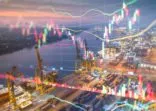Amid investors’ desire to identify companies playing their part in mitigating climate risk, ETFs offer an effective way to apply a detailed and transparent screening process.
Investing in ESG screened products is a growing requirement for investors as they seek to encourage companies to boost ESG credentials.
According to Jacqueline Pang, head of ETF and indexing sales for HSBC Asset Management (HSBC AM) in Asia Pacific, this reflects an increasingly sharp focus by investors to redirect capital away from companies with weaker ESG credentials towards the better ones.
By extension, this should potentially lead to higher returns. “Over time, we would expect those companies that have adopted sustainable practices to be rewarded – good ESG credentials often go hand in hand with lower risk as there is a tangible relationship between ESG awareness and more conscientious management practices,” added Pang.
She also believes that an ever-wider array of suitable ESG-focused solutions gives investors more options to participate in encouraging and helping companies transition and play their part without sacrificing returns. “Companies that are transitioning to participate in a low carbon economy may not have the best ESG scores. However, if they are committing to transition, a screening process which accounts for that can help offset the often-expensive transition process.”
FTSE Developed ESG Low Carbon Select Index vs FTSE Developed Index (5-year performance)

Source: Bloomberg, from 31 October 2017 to 31 October 2022. Investment involves risks. Past performance is not indicative of future performance.
Pang sees stewardship as another important consideration for investors in how they select ETFs and view sustainable strategies generally. Yet it is still underrated by investors. “We are engaging companies in an active way to drive change where we see gaps in their ESG agenda.”
Such efforts can make a big difference, she explained, to encourage companies to improve their sustainability practices, in turn enhancing their overall resilience.
Having a clear ESG agenda
However, to direct capital to those companies that can make a positive impact on climate change, investors must first know what they want to achieve.
“Investors in Asia are not always clear yet about their own ESG objectives, nor as familiar as they could be about disclosure and reporting requirements,” explained Pang.
While there is no right or wrong approach, she said investors need to have a mandate based on their primary ESG objective, whether this is led by performance or by ESG goals. “In our opinion, it should be goals-led. Investors should opt first and foremost for products with a screening process that limits their exposure to stocks with poor ESG credentials.”
That approach can then help investors select products where the screening process works to achieve their sustainable investment goals. How they want their capital to incentivise changes in corporate behaviour.
Further, it can help give them the required comfort about investments that have genuinely “green” and sustainable targets, to avoid greenwashing risks. “It is important for investors to know the right questions to ask,” said Pang. “They can then go deeper in understanding the product offering and assessing whether the product meets their sustainable investment objectives.”
Getting aligned on climate commitments
These are all key considerations for HSBC AM as part of its product development and in how it integrates ESG within its investment processes.
Its suite of Paris-aligned ETFs, for example, aim to help investors encourage companies to sync their environment strategies with the Paris Agreement.
This is notable as part of two of the newer Article 9 funds, launched in April 2022, which target stocks in emerging markets and Asia Pacific excluding Japan.
The firm’s MSCI Emerging Markets Climate Paris Aligned UCITS ETF, along with the MSCI AC Asia Pacific ex-Japan Climate Paris Aligned UCITS ETF, both bolster efforts by the firm to expand its range of net-zero options for increasingly climate-conscious investors.

Source: HSBC Asset Management. For illustrative purpose only.
A sustainable future for ETFs
As investors across Asia Pacific progress further along their individual ESG journeys, perhaps the most important step is for them to develop clear sustainability objectives.
In turn, they will likely become more familiar with disclosure practises of companies, facilitating ongoing monitoring and understanding of changing reporting expectations, to ensure that as more regulation and standards emerge, they can make the right decisions for their own portfolios.
As they do this, investors should increasingly see ESG-focused ETFs for the value they offer: to engage companies on environmental issues such as climate change. Sustainable products are by no means “passive” solutions – they integrate active screening and engagement processes in a systematic manner.
“The belief that ‘passive’ products mean a ‘passive’ approach to ESG is a misnomer,” said Pang. “In reality, we take a very active approach.”
The HSBC ETF range, for example, is physically replicated. “We are buying the underlying securities, so we have the opportunity to directly engage senior management. This is a big focus for us.”
Visit here for more details.
This document is prepared for general information purposes only and does not have any regard to the specific investment objectives, financial situation and the particular needs of any specific person who may receive it. Any views and opinions expressed are subject to change without notice. This document does not constitute an offering document and should not be construed as a recommendation, an offer to sell or the solicitation of an offer to purchase or subscribe to any investment. Any forecast, projection or target where provided is indicative only and is not guaranteed in any way. HSBC Global Asset Management (Hong Kong) Limited (“AMHK”) accepts no liability for any failure to meet such forecast, projection or target. AMHK has based this document on information obtained from sources it reasonably believes to be reliable. However, AMHK does not warrant, guarantee or represent, expressly or by implication, the accuracy, validity or completeness of such information. Investment involves risk. Past performance is not indicative of future performance. Please refer to the offering document for further details including the risk factors. This document has not been reviewed by the Securities and Futures Commission. Copyright © HSBC Global Asset Management (Hong Kong) Limited 2022. All rights reserved. This document is issued by HSBC Global Asset Management (Hong Kong) Limited.


















